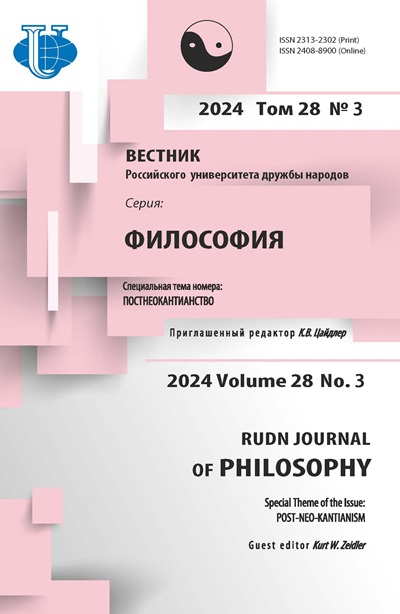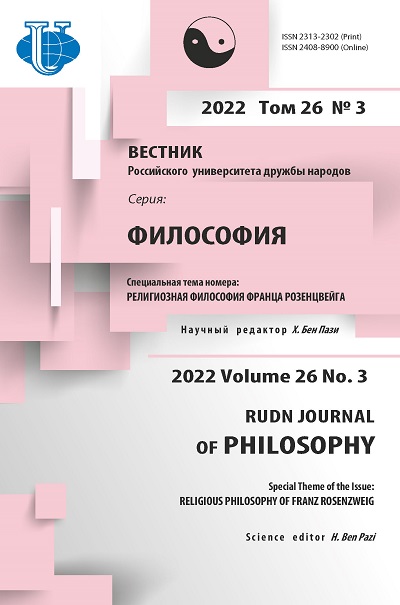Философия акселерационизма: новый путь осмысления современной социальной реальности (в контексте идей Ника Ланда)
- Авторы: Чистяков Д.И.1
-
Учреждения:
- Российский университет дружбы народов
- Выпуск: Том 26, № 3 (2022): РЕЛИГИОЗНАЯ ФИЛОСОФИЯ ФРАНЦА РОЗЕНЦВЕЙГА
- Страницы: 687-696
- Раздел: ЧЕЛОВЕК И ОБЩЕСТВО
- URL: https://journals.rudn.ru/philosophy/article/view/32115
- DOI: https://doi.org/10.22363/2313-2302-2022-26-3-687-696
Цитировать
Полный текст
Аннотация
Современные типы социальной реальности, охваченные медиатизацией, виртуализацией и технологическими процессами, требуют сегодня обновленных путей их постижения. Данное исследование посвящено возникшей в последнее время новой аналитической форме осмысления современности - акселерационизму, который пока достаточно редко обсуждается в российской философии. Представители акселерационизма призывают к радикальному и быстрому ускорению социально-экономических и технологических процессов капиталистических обществ. Беря за основу исторически сложившиеся характеристики капитализма, последователи этого теоретического движения нацеливают на перенаправление их функционирования на столь стремительное развитие, при котором все деструктивные элементы существующей капиталистической системы просто не выдержат и отпадут в силу их неустойчивости и неэффективности. В статье отражены некоторые идеи «Манифеста акселерационистской политики» А. Уильямса и Н. Срничка, после которого усилилась и приобрела отчетливые теоретические ориентиры акселерационистская тенденция в философии и социальных науках. Освещаются идеи «Манифеста» об ускорении технологической эволюции как средстве разрешения социальных конфликтов, о высвобождении всех латентных сил капиталистического производства для достижения состояния посткапитализма, поддержки нового типа неолиберализма и глобальной «гегемонии левых», отрицания возврата к фордистскому типу производства и призыва восстановить будущее как таковое, возможности которого уже утрачены провалом неолиберальных проектов и «параличом» левых сил. Таким образом в «Манифесте» и работах самого яркого представителя и основателя акселерационизма Ника Ланда представлена позиция создания совершенно новой программы и самого стиля мышления в отношении изменения современной капиталистической системы по вектору акселерации (ускорения). Особое внимание уделяется восприятию и интерпретации концепта «детерриториализация» Ж. Делеза и Ф. Гваттари в творчестве Н. Ланда. Подчеркивается нацеленность акселерационизма на будущее, как своего рода реализацию парадоксального тезиса «взгляда назад из будущего». В содержании акселерационистской теории Н. Ланда показаны фундаментальные понятия K-space (киберпространство), K-war (кибервойна), время и реальность, технократическое будущее социума как Техономическая Сингулярность, расширение капитала в противоположность его ретерриториализации. Выводится смысл идеи Ланда об ускоренном «разгоне» капитализма и переходе к более прогрессивному будущему через крах отживших структур и явлений существующей системы капитализма и его технологического базиса.
Об авторах
Денис Игоревич Чистяков
Российский университет дружбы народов
Автор, ответственный за переписку.
Email: chistyakov-di@rudn.ru
ORCID iD: 0000-0001-8805-297X
кандидат социологических наук, заместитель директора по научной работе и международному сотрудничеству, Институт гостиничного бизнеса и туризма
Российская Федерация, 117198, Москва, ул. Миклухо-Маклая, д. 6Список литературы
- Avanessian A. From the Editorial Board. Back from the Future: Orientations of Acceleration. Logos. 2018;28(2):2-6. (In Russian).
- Land N. “The Only Thing I Would Impose is Fragmentation” - Interview with Nick Land. Logos. 2018;28(2):31-55. (In Russian).
- Bryant L, Srnicek N, Harman G. Towards a Speculative Philosophy. In: The Speculative Turn: Continental Materialism and Realism. Bryant L, Srnicek N, Harman G, editors. Melbourne: re.press; 2011.
- Land N. Fanged Noumena. Collected Writings 1987-2007. Second Edition. Falmouth, UK: Urbanomic / Sequence Press; 2012.
- Noys B. The Persistence of the Negative: A Critique of Contemporary Continental Theory. Edinburgh: Edinburgh University Press; 2010.
- Williams A, Srnicek N. #ACCELERATE MANIFESTO for an Accelerationist Politics. Critical Legal Thinking; 2013 Available from: https://criticallegalthinking.com/2013/05/14/accelerate-manifesto-for-an-accelerationist-politics/ (accessed: 11.08.2022).
- Toscano A. The Prejudice Against Prometheus. Senselogic; 2013 [cited August 11, 2022]. Available from: https://cengizerdem.wordpress.com/2013/10/25/the-prejudice-against-prometheus-alberto-toscano/
- Avanessian N. Critique - Crisis - Acceleration. Logos. 2018;28(2):79-86. (In Russian).
- Land, N. A Quick-and-Dirty Introduction to Accelerationism. The Jacobite Mag; 2017. Available from: https://web.archive.org/web/20170601002436/http://jacobitemag.com/2017/05/25/a-quick-and-dirty-introduction-to-accelerationism/ (accessed: 11.08.2022).
- Nietzsche F. The Will to Power. Kaufmann W, Hollingdale RJ, translators. New York: Vintage Books; 1968.
- Deleuze G, Guattari F. Anti-Oedipus: Capitalism and Schizophrenia. Hurley R, Seem M, translators. New York: Penguin Classics; 2009.
- Marx K. On the Question of Free Trade. Marxists.org; 2022. Available from: https://www.marxists.org/archive/marx/works/1888/free-trade/ (accessed: 11.08.2022).
- Land N. Teleoplexy: Notes on Acceleration. Logos. 2018;28(2):21-31. (In Russian).
- Kelly K. What Technology Wants. London: Penguin Books; 2011.
















